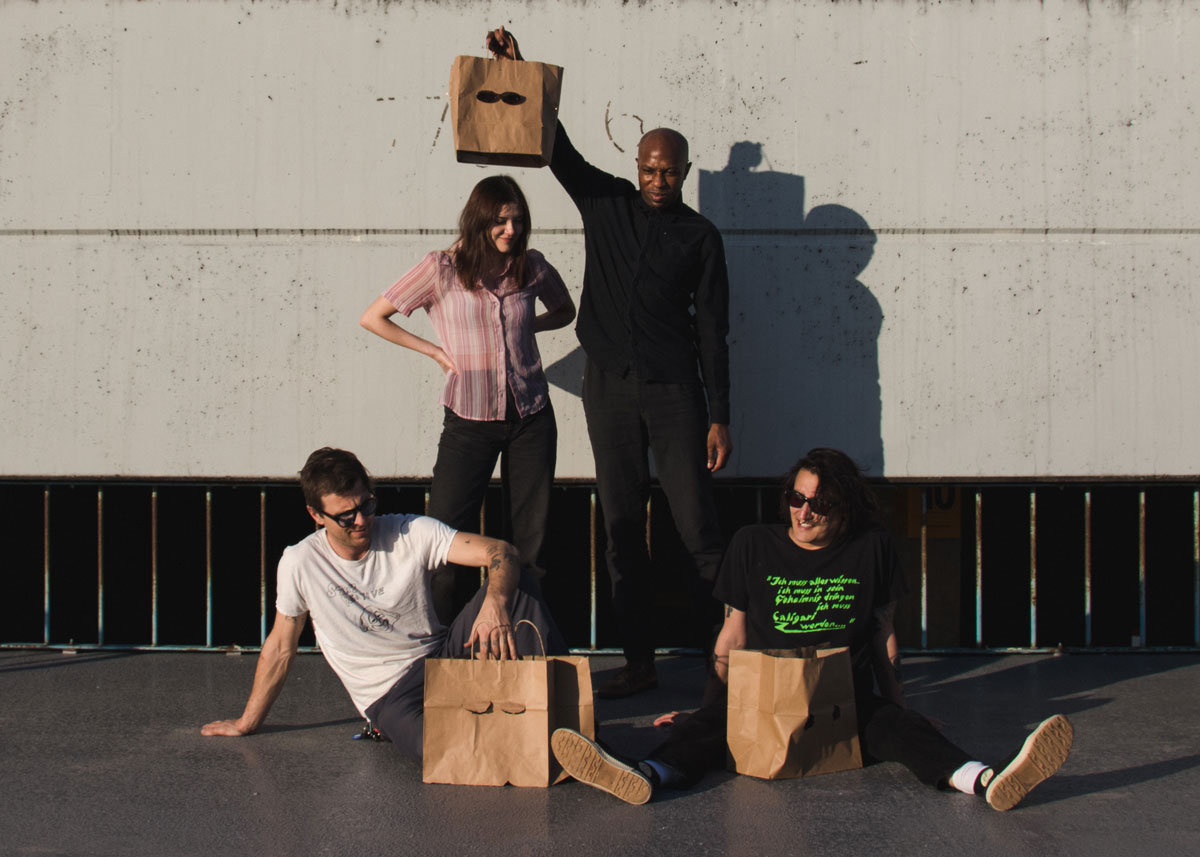RINSE DREAM is an art-punk project with one foot in the absurd. The group consists of bassist and vocalist Hannah Karren, drummer Tony Dallas, Justin Patterson on the sampler, and Justin Gradin on guitar and vocals. Combining experienced musicianship and bizarro creativity, the band embraces a wild and constant resculpting, with no two shows ever played the same. After a long history of playing live, in 2022 they released their debut LP “SPACES”. I got to talk to Hannah and the Justins over a couple of pitchers about sampling, stage banter, and the practice of collaging the clownish with the dark.
Emma Watson: Tell me about the inception of the project.
Justin Gradin: Justin Patterson and I had a band that was a pretty straight up kind of punk band, and it just didn’t feel right. Both he and I come from more of an art — painting, sculpting — world, and we were just kind of bored of going straight. So then we started bringing in sounds and samplers, and we started going, “Ah, what if we made it like a collage?”
Justin Patterson: We met in the studio!
JG: We met in an art studio, yeah. Before we ever put out SPACES, he and I put out a 7-inch record called Jokes/Laughter. The a-side of the record is me doing a wholesome version of the Aristocrats Joke, and the b-side is just a collage of him forcing himself to laugh. The person who put the record out had never actually listened to the record. They thought we’d made art music or whatever, so when the record came out, the person was very mad. And then they pretty much gave us back all the 45’s.
JP: We still have a fuckton of them, too.
Hannah Karren: Can you tell the Aristocrats joke?
JP: It’s a tradition in standup comedy from way back. There’s a basic version of the joke, but everyone strays from it and tries to make it as dirty as possible.
JG: The set-up is the whole thing. Then, everyone says, “Well, what was the act called?” and the punchline is “they were called the Aristocrats,” even though the joke was so dirty. So I just did a backwards version of it, where the whole thing was really wholesome.
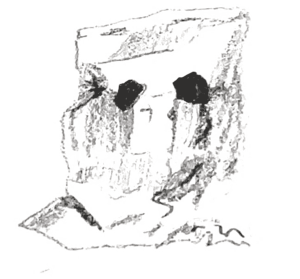
EW: When I was listening to the record, I was thinking about how the sound doesn’t stop — It’s so persistent, almost relentless. It reminded me of the lyrical theme of control and powerlessness. I was wondering what forces you might be responding to in the writing.
JG: I think [that part of] the record came about because we were a live band for so long. I hate stage banter, and I hate when bands pause for too long in between songs, too. And so I was like, “Well, what if one of us is always doing something?” A song ends, and it doesn’t matter what it is, but something’s happening, and then all of a sudden, it turns into something else. So at the end of the night, you have formed this weird, mutant thing — and I really like that. If you see [something] live you can’t always decipher [what’s happening] if you don’t know the songs well.
With our lyrics though, I don’t know. When we put out the video for “Ssufferr”, people were saying “Oh, it’s such a positive song!”, and I was like “Oh, weird.” I wrote that song when I was doing drugs and working in the Downtown Eastside and everything was horrible.
JP: I’ve always loved Justin’s lyrics, because everything comes out in this crazy pastiche or collage of ideas, and in cartoonish, weird language — a lot like his art style. And because I know [about him] working in the Downtown Eastside, just hearing the horrific stories about the stuff you have to process when you’re down there for so long, it all sounds to me like one metaphor removed from this weird clown world . Like processing through sublimating it into a totally different reality.
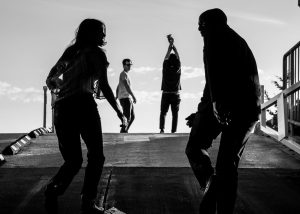
EW: Can you talk more about the sampling on the record? I didn’t realize it was part of the inception of the group.
JP: [Justin]’s got a history of making weirdo sound collage tapes and producing them, and I was using a sampler with an old band doing electronic stuff…
JG: We were both doing it, yeah. It comes from our abilities to play things, mixed with boredom from those abilities to play things. I’ve played with tons of super good musicians in the past, but it’s kind of more fun to be like, “Okay, instead of having a heavy guitar or something over this thing, what if we had the sound of 15 people getting their hair cut?” It seemed more interesting. There’s a duality that comes from matching sampler sounds with the lyrics, too. It’s kind of nice that you can be saying one thing, and then force someone to [associate it with] something else.
HK: I don’t like it. With some of the new songs that are not on this record, I’m like, “Man, Justin, this is the most beautiful song.” We all sit down and learn the song, and then we get into the space and it’s [paired with] the sound of bouncing balls!? And sometimes, I actually don’t want to be taken to this other place! JG: There’s a whole new record ready to go, and honestly, they’re like the catchiest songs I’ve ever written, but I want them to be so fucked up.
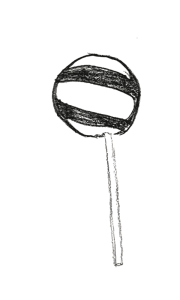
EW: What is that impulse, why?
JG: I think it’s just a reflection of my own life. There’s always something really beautiful happening, and something absolutely fucked up happening. And that’s probably a lot of people’s lives. So it’s kind of nice, I think, to have this beautiful melody and then have it just be completely…
HK: Obliterated.
JG: Obliterated. It’s like every morning, I wake up at 7:00 a.m. because of these screaming birds. I don’t know what they’re doing, but they’re screaming outside this window. It’s like they’ve never heard a birdsong. That’s kind of what I’m doing in the songs. Also, I used to be obsessed with John Cage, 4:33. The chairs squeaking, people coughing, the traffic outside…that becomes the piece.
EW: Yeah. I was thinking about that when you said you don’t like stage banter — instead, you create this conglomerate.
JG: Yes. Every sound becomes a part of the creation. For me, that’s more fun. Yeah, fuck, stage banter. I used to have a rehearsal space next to that band Hedley, and that singer guy, that guy used to practice his stage banter. We’d be finishing a song, and we’d hear “Saskatoon, how are you doing tonight?!” We’d all go out for a cigarette or something, and he’d be wearing these daisy duke shorts, sucking on his lip ring looking at us, and we’d be like “What is this dude’s deal?”
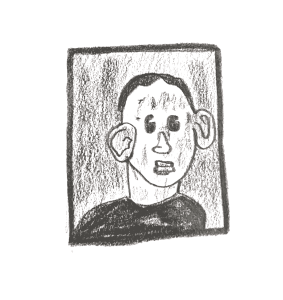
EW: Do you think of this album as dark? It seems other people sometimes don’t.
JP: I’ve played it for people, and they’re like, “your band’s really fun,” and that’s great – it’s rock ‘n’ roll, that’s what I love. It is fun, it allows you to mesh your energy with something and release it. But in terms of the content, I think there’s [a lot here] that is super dark — maybe colourful dark? I would say my relationship to Justin’s lyrics, and to the project, is that it is like processing the fucked-upness of the world, and turning it into something that you can share in a way that gets everyone together.
HK: I think it is fun, though. Sonja, one of the old bassists, once described it to me as pop music. When I started with the band, she was like, “you’re going to love it, it’s like pop music.” Once she said that, I listened to it and I was like “This is pop music!”
Me: How was playing it live?
HK: It was good. I’ve been a RINSE DREAM fan for a long time, and every RINSE DREAM show I’ve ever seen, I’m like, “this is not the same band.”
EW: What changes?
HK: [Justin and Justin] are all over the place, they’re doing their own thing. Tony is an anchor. It’s every man for himself up there except for Tony, who takes care of me.
JG: Tony will be like, “this song’s 112 BPM,” and me and Patterson will have bowls of spaghetti on our heads.
HK: Last night, the show starts, and Patterson pulls out a trombone and is like, “I’m going to play this trombone for a while,” and I’m like, “Okay, this is news to me.” The rhythm section doesn’t like improv as much as the pedal boys.
JG: One time, [Patterson] had this World War I tuba, and I had a clown comb with a contact mic hooked up to it, and my hair was down to my shoulders. I was combing my hair with the contact mic and it was like SCHDFFFF, and he was playing the tuba, and everyone [in the audience] was just like …
HK: It’s like those clickbait things where it’s like “Doctors hate ‘em!”, but instead, it’s “Sound guys hate ‘em!”
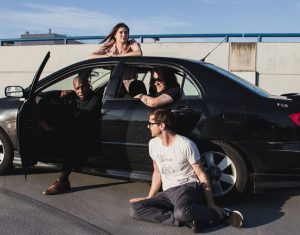
EW: What do you hope that audiences come away from your shows feeling?
JP: I mean, for me, the experience that I look for with any kind of art experience is getting lost in that little world, whatever it is. If we can draw people in, and have them confused, or excited, or stoked on a really catchy hook for a second, and then confused again, or scared, or whatever…that’s pretty exciting for me to imagine people having that experience.
JG: For me, I want them to feel like the Kool-Aid man right before, and right after, he jumps through the wall.
HK: I think as an audience member, I’m just getting the sensation of “wall.”
JG: At some point, you’ve gotta bust through it, y’know?
HK: As an audience member, though, I love RINSE DREAM. I think the shows are fun, and I think they’re really interesting. I’ve played with RINSE DREAM with my other band and I’ve been like, “I’m glad RINSE DREAM’s here, because my stuff feels like more of the same, and this is gonna really break it up.” That show at Black Lab a couple of months ago was so crazy — Justin’s mic completely cut out and it didn’t even matter.
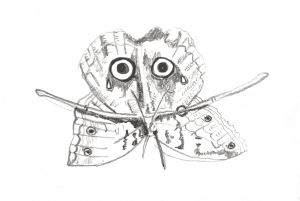
Me: What are you excited for coming up?
JG: Relocating! We’re pretty much going to be an LA-based band within a month. We’re just going to jump into a whole new thing.
JP: Very soon, we’re playing in July, a group of shows in California with Necking and NORMANS that are gonna be super fun!
JG: It’s fun to go to a city where there’s a massive scene of stuff happening.
Me: Seems compatible with your maximalist approach!
JG: Yeah. I think it’ll be good.


